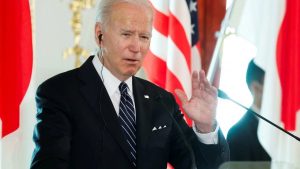
TOKYO: In a potential game-changer aimed at spurring economic integration in the region, US President Joe Biden unveiled the much-awaited Indo-Pacific Economic Framework (IPEF) in Tokyo with India as one of the first twelve signatories.
The IPEF was launched in the Japanese capital in the presence of Japanese Prime Minister Fumio Kishida on May 23. Prime Minister Narendra Modi also attended the launch event as India is among 12 initial partners of the IPEF.
“This framework is a commitment to working with our close friends and partners in the region on challenges that matter most to ensuring economic competitiveness in the 21st century,” said President Biden.
The landmark economic arrangement has been designed to provide an alternative to China-dominated trade deals in the region such as RCEP and CPTPP.
In his comments during the launch ceremony, PM Modi underlined that that the announcement of IPEF is a declaration of a collective desire to make the Indo-Pacific region an engine of global economic growth. “India has historically been at the centre of trade flows in the Indo-Pacific region, having the world’s oldest commercial port in Lothal, Gujarat,” he said.
Mr Modi called for finding common and creative solutions to tackle economic challenges of the Indo-Pacific region. He expressed India’s commitment towards working with all Indo-Pacific countries for an IPEF which is both inclusive and flexible. He underlined that the foundation of resilient supply chains must be 3T’s – Trust, Transparency and Timeliness.
India is committed to a free, open, and inclusive Indo-Pacific region and believes that deepening economic engagement among partners is crucial for continued growth, peace, and prosperity, said India’s external affairs ministry in a statement. “India is keen to collaborate with partner countries under the IPEF and work towards advancing regional economic connectivity, integration and boosting trade and investment within the region,” it said.
With the launch of the process to establish the IPEF, partner countries will begin discussions focusing on strengthening economic cooperation and achieving shared goals.
It is not a “traditional trade deal”, but a “new model of economic arrangement that will set the terms and rules of the road for trade and technology and supply chains for the 21st century,” explained US National Security Adviser Jake Sullivan described the Indo-Pacific Economic Framework (IPEF).
“It is going to be a wide-ranging and comprehensive set of countries from across the region, a mix of different kinds of economies,” said Jake Sullivan.
Besides India, the other nations which have signed on to IPEF include Australia, Brunei, Indonesia, Japan, South Korea, Malaysia, New Zealand, The Philippines, Singapore, Thailand, and Vietnam. Collectively, these 12 countries represent 40% of the world GDP.
Ahead of PM Modi’s visit to Japan, India’s Foreign Secretary Vinay Mohan Kwatra had explained the importance of IPEF for India. “We all do realise that in so far as the Indo-Pacific region is concerned, the economic segment of it is a very important segment, both in terms of harnessing the opportunities of economic partnership that are available in the region, whether they are in various dimensions of economic areas, or they are related to capacity building,” he said.
(Manish Chand is CEO-Editor-in-Chief, India Writes Network and India and The World magazine, is in Tokyo to report on and analyse the Quad summit and Prime Minister Modi’s visit to Japan. He is Director, Centre for Global Insights India, a think tank focused on global affairs)
Author Profile

- Manish Chand is Founder and Editor-in-Chief of India Writes Network (www.indiawrites.org) and India and World, a pioneering magazine focused on international affairs. He is CEO, Centre for Global India Insights, an India-based think tank focused on global affairs.
Latest entries
 India and the WorldFebruary 17, 2026South-by-South: Focus on people-centric solutions at India AI summit
India and the WorldFebruary 17, 2026South-by-South: Focus on people-centric solutions at India AI summit India and the WorldFebruary 7, 2026Modi hails interim India-US trade deal, Goyal says no concessions made on agriculture
India and the WorldFebruary 7, 2026Modi hails interim India-US trade deal, Goyal says no concessions made on agriculture India and the WorldFebruary 2, 2026Trump announces trade deal with India, Modi ‘delighted’
India and the WorldFebruary 2, 2026Trump announces trade deal with India, Modi ‘delighted’ India and the WorldJanuary 31, 2026Palestinian minister bats for mediatory role for India in ending Gaza conflict
India and the WorldJanuary 31, 2026Palestinian minister bats for mediatory role for India in ending Gaza conflict







